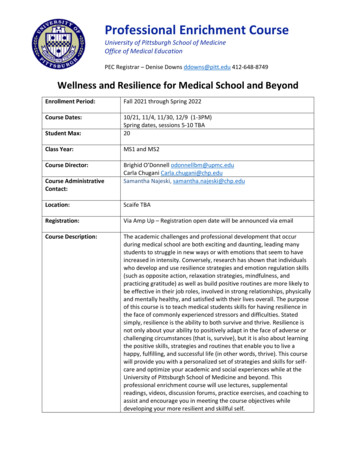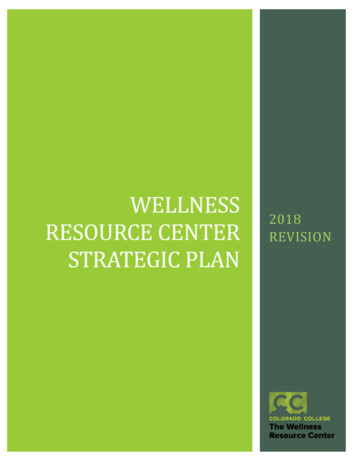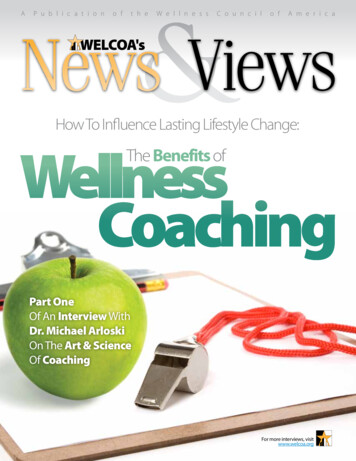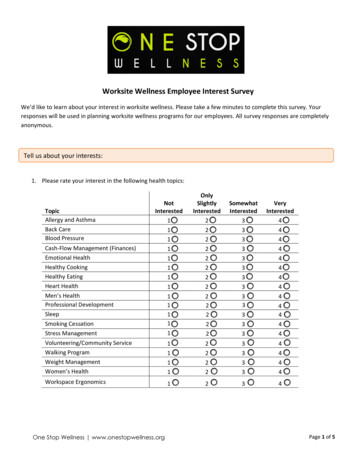
Transcription
Professional Enrichment CourseUniversity of Pittsburgh School of MedicineOffice of Medical EducationPEC Registrar – Denise Downs ddowns@pitt.edu 412-648-8749Wellness and Resilience for Medical School and BeyondEnrollment Period:Fall 2021 through Spring 2022Course Dates:Student Max:10/21, 11/4, 11/30, 12/9 (1-3PM)Spring dates, sessions 5-10 TBA20Class Year:MS1 and MS2Course Director:Brighid O’Donnell odonnellbm@upmc.eduCarla Chugani Carla.chugani@chp.eduSamantha Najeski, samantha.najeski@chp.eduCourse AdministrativeContact:Location:Scaife TBARegistration:Via Amp Up – Registration open date will be announced via emailCourse Description:The academic challenges and professional development that occurduring medical school are both exciting and daunting, leading manystudents to struggle in new ways or with emotions that seem to haveincreased in intensity. Conversely, research has shown that individualswho develop and use resilience strategies and emotion regulation skills(such as opposite action, relaxation strategies, mindfulness, andpracticing gratitude) as well as build positive routines are more likely tobe effective in their job roles, involved in strong relationships, physicallyand mentally healthy, and satisfied with their lives overall. The purposeof this course is to teach medical students skills for having resilience inthe face of commonly experienced stressors and difficulties. Statedsimply, resilience is the ability to both survive and thrive. Resilience isnot only about your ability to positively adapt in the face of adverse orchallenging circumstances (that is, survive), but it is also about learningthe positive skills, strategies and routines that enable you to live ahappy, fulfilling, and successful life (in other words, thrive). This coursewill provide you with a personalized set of strategies and skills for selfcare and optimize your academic and social experiences while at theUniversity of Pittsburgh School of Medicine and beyond. Thisprofessional enrichment course will use lectures, supplementalreadings, videos, discussion forums, practice exercises, and coaching toassist and encourage you in meeting the course objectives whiledeveloping your more resilient and skillful self.
Objectives:Upon completion of this course, participants will be able to: Directly practice a variety of resilience skills, habits, androutines in different areas of your life to minimize stress andoptimize well-being. Describe why intentionally ‘practicing’ resilience skills is criticalto developing the fluency to use and reap the benefits fromthem.Pre-Requisites:NoneRequirements:Students must demonstrate respect for each other, the faculty, and thesubject matter.2. Each student will be required to attend 8 of the 10 skill workshops.3. Students will be expected to engage actively in the class4. Students are encouraged to complete diary cards on a weekly basisfor skills practice in between sessions. These cards are optional but arehighly recommended.Texts:Longitudinal Professional Enrichment CourseTime: October 2021-March 2022Location: Scaife HallInstructors:Brighid O’Donnell, MDodonnellbm@upmc.edu4401 Penn Ave, FP 2131Phone: (814) 571-9070Carla D. Chugani, PhD, LPCCarla.chugani@chp.edu120 Lytton Avenue, #302.18Phone: (248) 910-2771COURSE OVERVIEW:LESSON 1: Awareness and empowerment through mindfulness-based practicesThis lesson will discuss the benefits of specific mindfulness-based practices and how they enableyou to become more aware of yourself, others, and your surroundings, which, in turn, empowersyou to be more effective even during stressful or challenging situations.LESSON 2: Values clarification and commitmentThis lesson will cover the importance of clarifying your values (that is, identifying what mattersmost) and committing to living consistent with your values (that is, doing what matters most).
LESSON 3: Habits, willpower, and distress toleranceThis lesson discusses the importance of willpower and how to exercise it. We will also coverdifferent ways you can withstand difficult and/or painful experiences, feelings, and momentswhile being healthy and kind to yourself.LESSON 4: Reality Acceptance SkillsThis lesson will discuss the benefits of specific mindfulness-based practices and how they enable you tobecome more aware of yourself, others, and your surroundings, which, in turn, empowers you to bemore effective even during stressful or challenging situations.LESSON 5: Choosing your attention and practicing gratitudeThis lesson will discuss the research and practices that have demonstrated that people have theability to purposefully choose what they devote their attention to rather than only focusing on thenegative or stressful aspects of life. When people intentionally choose to attend to the positiveaspects of their lives, then they are more likely to feel better mentally and physically.LESSON 6: Model of Emotion: Identifying targets for interventions and cultivating positiveemotionsThis lesson will review how our emotional responses work and why they differ from one day to anotherwhen exposed to the same stimuli. We will also cover specific interventions for each part of the modelof emotions, spending particular time reviewing how to cultivate positive emotions to reducevulnerability factors.LESSON 7: Identifying unhelpful thoughts and altering them to be helpfulThis lesson will cover the basics of cognitive restructuring within the area of psychology calledcognitive behavior therapy. Specifically, we will cover the benefits and specific practices of howto identify, dispute, and restructure unhelpful thoughts to develop more helpful ways of thinkingabout work and life.LESSON 8: Managing intense negative emotionsThis lesson will discuss how everyone experiences emotions and how we can manage intenseemotions in a healthy, productive way that determines whether we are likely to engage inregrettable behaviors or not. We will also discuss research-based strategies to use to manageemotions before they get too intense.LESSON 9: Developing Interpersonal Effectiveness SkillsThis lesson will teach three specific skills for effective communication in relationships. Each skill is usefulfor different types of situations: asking for something you need, building and maintaining relationships,and maintaining self-respect.Lesson 10: Balancing Options and Intensity in IE SkillsThis lesson expands on the content from the previous lesson by discussing how to know when to useeach skill and what you can do to increase the likelihood of that skill working.
SCHEDULE OF CLASS ACTIVITIES:SessionSession 1TopicMindfulnessSupplemental Reading & ViewingsReading:What are values and why you need them for afulfilling s-and-why-need-them-for-fulfilling-lifeViewing: WOOP There it sode-30-woop-there-it-isPassenger on the Bushttps://www.youtube.com/watch?v eJyHBifSZb8Don’t forget to start your first diary card!Session 2Values and GoalsReading:Weir, K. (2012). What you need to know aboutwillpower: The psychological science of selfcontrol. American Psychological Association, 117.https://www.apa.org/helpcenter/willpower Viewing: Four Surprising Ways to Increase Your Willpowerhttps://www.youtube.com/watch?v AaXLpZYbs3M
Session 3WillpowerDistress ToleranceReading:Hall (2012). Radical Acceptance: Sometimesproblems can’t be solved. Psychology es-mind/201207/radical-acceptance If Your Goal in Therapy is to “Be Happy” Youmight Want to Rethink That. Here’s ink-that-heres-why/Viewing: Session 4Reality AcceptanceSkillsHow Marsha Linehan Learned RadicalAcceptancehttps://www.youtube.com/watch?v OTG7YEWkJFIReading: Emmons, R. (2010). Why gratitude is good.Greater Good item/why gratitude is good Morin, A. (2014). 7 Scientifically proven benefits ofgratitude that will motivate you to give thanksyear-round. Forbes d/- 5912c22183c0 Healthbeat (2017). Giving thanks can make youhappier. Harvard Health at/giving-thanks-can-make-you-happierViewing: How to Take in the w to take in the goodWhat Good is em/what good is gratitudeThe Power of em/the power of gratitude
Session 5Choosing AttentionGratitudeReading:Mazza et al., 2016. DBT Skills in Schools: STEPSA, 422, 457Viewing: Session 6Model of Emotion:Identification ofintervention targetsReading:Tsipursky G. (2016). How to manage yourthoughts, feelings, and behaviors. ghts-feelings-and-behaviors. Boyes, A. (2013). Cognitive restructuring.Psychology ice/201301/cognitive-restructuring.Viewing: Session 7Positive Emotions Open Our Mindhttps://www.youtube.com/watch?v Z7dFDHzV36gCognitive Behavioral Therapy Techniqueshttps://www.youtube.com/watch?v HoFNs3r0GoCognitive Behavioral Therapy Explainedhttps://www.youtube.com/watch?v WhMmZJ3H1E8Automatic Thoughtshttps://www.youtube.com/watch?v m2zRA5zCA6MIdentifying Unhelpful Reading:Thoughts Wachter, A. (2013). Emotions 101: How to revealChanging them toand heal what you feel. Huffington Post,Helpful r/managing-emotions b 2717206.html.Viewing: Getting Stuck in the Negativeshttps://www.youtube.com/watch?v 7XFLTDQ4JMk
Session 8Managing NegativeEmotionsReading: Mazza et al., 2016. DBT Skills in Schools: STEPS-A,466-474Viewings Session 9Session 10Interpersonal Effectivenesshttps://www.youtube.com/watch?v 3NzjE0ATawsDevelopingInterpersonalEffectiveness Skills(Part 1)Reading:DevelopingInterpersonalEffectiveness Skills(Part 2)Reading: Mazza et al., 2016. DBT Skills in Schools:STEPS-A, 475-479. Du, Feng, & Chi (2017). Self-esteem andsubjective well-being revisted: The roles ofpersonal, relational, and collective cle?id 10.1371/journal.pone.0183958 Social support: Tap this tool to beat stress.Mayo 445.Viewing: The Power of Vulnerabilityhttps://www.ted.com/talks/brene brown on vulnerability?language enDIARY CARDSDiary Cards will be used in this course as a document that helps you track the use of the skills you arelearning in this class. While these cards are optional, we highly encourage you to complete these cards foryour own benefit on a weekly basis for reinforcement and accountability purposes.
NOTE TO ALL STUDENTS:UNIVERSITY POLICIES:ALTHOUGH THIS CLASS IS FOCUSED ON HELPING YOU LEARN SKILLS FOR MENTAL HEALTH, WELLNESS,AND RESILIENCE, PARTICIPATING IN THIS CLASS IS NOT THERAPY AND SHOULD NOT BE CONSIDERED TOBE “TREATMENT” FOR ANY TYPE OF MENTAL HEALTH ISSUE. IF YOU ARE EXPERIENCING MENTALHEALTH RELATED SYMPTOMS, PLEASE REFER TO THE FOLLOWING CONTACTS:Official Medical School Counselors (free and confidential)Darrell Phillips5889 Forbes Avenue, Suite 210412-327-2189phillipscounseling@gmail.comLinda Ewing155 N. Craig Street, Suite ial Medical School Psychiatrist (free and confidential – referral through one of our schoolcounselors)Dr. Jordan Karp412-246-6048karpjf@upmc.eduACADEMIC INTEGRITY:All students are expected to adhere to the standards of academic honesty. Any student engaged incheating, plagiarism, or other acts of academic dishonesty would be subject to disciplinary action. Anystudent suspected of violating this obligation for any reason during the semester will be required toparticipate in the procedural process, initiated at the instructor level, as outlined in the UniversityGuidelines on Academic Integrity http://www.pitt.edu/ provost/ail.html. This may include, but is notlimited to the confiscation of the examination of any individual suspected of violating the UniversityPolicy.
DISABILITY SERVICESDisability Statement - If you have a disability for which you are or may be requesting an accommodation,you are encouraged to contact both your instructor and Disability Resources and Services (DRS), 140William Pitt Union, (412) 648-7890, drsrecep@pitt.edu , (412)228-5347 for P3 ASL users, as early aspossible in the term. DRS will verify your disability and determine reasonable accommodations for thiscourse.STATEMENT ON CLASSROOM RECORDINGTo ensure the free and open discussion of ideas, students may not record classroom lectures,discussion and/or activities without the advance written permission of the instructor, and anysuch recording properly approved in advance can be used solely for the student’s own privateuse.
Enrollment Period: Fall 2021 through Spring 2022 . Course Dates: 10/21, 11/4, 11/30, 12/9 (1-3PM) Spring dates, sessions 5-10 TBA . Student Max: 20 . Class Year: MS1 and MS2 . Course Director: Brighid O'Donnell odonnellbm@upmc.edu Carla Chugani Carla.chugani@chp.edu . Course Administrat ive Contact: Samantha Najeski, samantha.najeski@chp.edu











